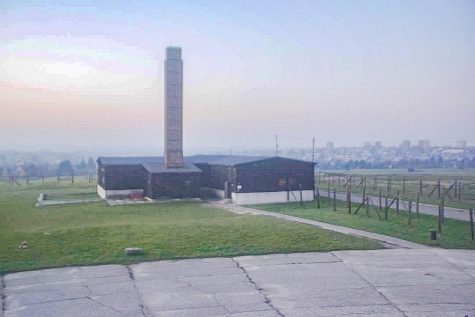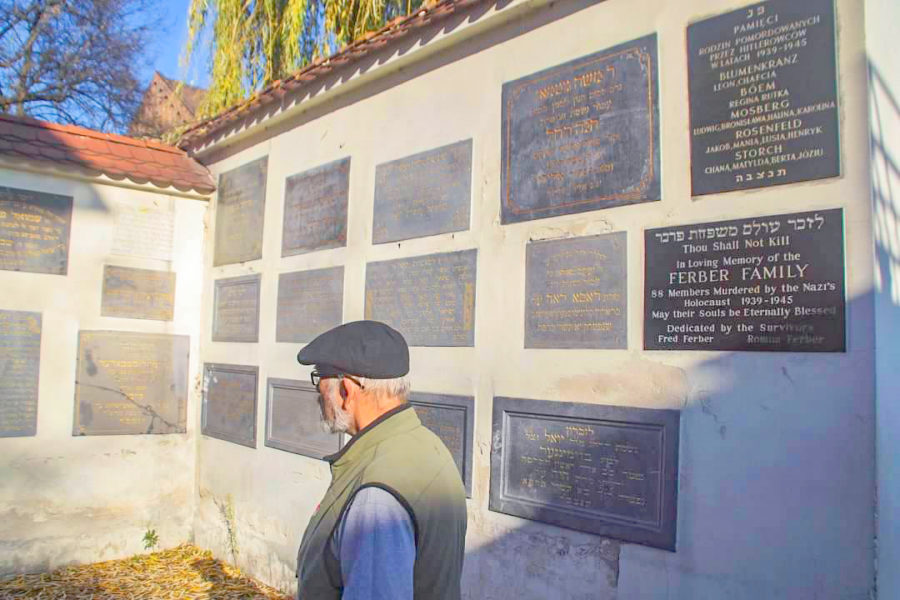In 2018, Rabbi Geoffrey Dennis trudged through the concentration camp. The chilly November air bit at his face as haze drifted through the Polish air. Dennis and his companion, Bruce, roamed about the barracks of Majdanek, taking in its terrible legacy. The open field was fenced so prisoners had nowhere to run. Time weathered away the camp, its buildings slowly crumbling. It was left exactly the way it was when the Russian army discovered it in 1944.
Dennis and Bruce walked the length of the camp to stand before an enormous concrete bowl. He peered over the edge at the ashes of the Majdanek victims, preserved by sodium silicate. Dennis and Bruce recited the Mourner’s Kaddish, the Jewish prayer for the dead.
The two friends continued to a processing room, where Nazis evaluated Jews on their slave labor prospects. Dennis examined the length of the room. Wall to wall stood wire containers. Filled to the brim with tens of thousands of shoes, ripped from their owners before their murder. Dennis looked in horror at all that was left. The overwhelming smell of leather and smoke made him gag.
Outside, the sky was colored gray, clouds windswept like a Van Gogh painting. If Dennis could have forgotten where he was, standing among the souls of those lost decades ago, he could almost appreciate the day. But he could not forget.
• • •
Dennis has been the rabbi of Congregation Kol Ami for 22 years. Flower Mound’s Jewish population is small, but he is grateful for what the congregation accomplishes.
“I like to describe it as small but fierce,” Dennis said. “It’s a wonderful community, and people are more involved, because without it, without us, there wouldn’t be much Judaism happening out here.”
Rabbis, he emphasized, are not priests. During school, Dennis earned a master’s in Hebrew literature as well an ordination.
“Any Jewish adult can do what I do. But I’m usually hired because I’m a demonstrated technical expert on Jewish tradition,” Dennis said.
There are a number of congregants at Kol Ami, like Joel Loeb, whose mother Liesl was a survivor.
She was 11 when her family escaped on the St. Louis, a German luxury liner. Captain Gustav Schroeder spent days negotiating with other sites to land. Eventually, Liesl and her family found refuge in England and came to America. Liesl is gone now, but Loeb makes sure her experience stays alive.
“It’s sort of left to the next generation to perpetuate that memory,” Loeb said.
Dennis describes himself as a “history geek.” In college, he trained as a historian. He believes looking back offers insight to the future.
“If something was possible at another point in history, it’s possible again,” Dennis said.
The Holocaust has been disputed for some time. When Dennis read that an administrator in Southlake said that teachers should present opposing views to the Holocaust, he was concerned. He believes that some teachers are now afraid to teach controversial subjects.

“That’s the frightening thing for me is that it creates a chilling effect against educating people,” Dennis said. “And I am all for educating people.”
Dennis couldn’t believe his eyes as he read that news story.
“That’s reprehensible because….what is the other side?” Dennis said. “That genocide is sometimes justified? That killing women and children can be the right thing to do? I mean, it’s bizarre.”
As for there being two sides at all, Loeb was indignant. He said the fact that it was said in a school environment too was even more scary for him.
“I don’t know what the other side would be. I mean, the Holocaust happened,” Loeb said. “And it’s what-ever’s documented….These are people’s stories of history. It’s not an opinion. So it can’t be treated as an opinion.”
Another recent trend that Jews find offensive is comparing events today to Holocaust crimes. FOX Nation commentator Lara Logan likened Dr. Anthony Fauci to the Nazi phsyician Josef Mengele known for his sadistic and often deadly experiments on children and twins.
“The comparison is outrageous,” Loeb said. “And Dr. Fauci is a scientist. He’s not doing experiments on people.”
Dennis tends to avoid making Holocaust analogies and urges others to do the same.
“They’re grotesque,” Dennis said. “They’re usually incredibly inaccurate, and they’re inflammatory. Because once you’ve called someone a Nazi, what’s there to say?”
Under Nazi rule, Jews were forced to wear the yellow Star of David on their clothing in public at all times. Their patches read “Jude,” the German word for Jew. This was the German government’s way to persecute Jews. The vast majority of those who choose not to get vaccinated do not use Holocaust analogies. However, a small group in Kansas recently wore the same yellow star.
“This is not the selection out of a group who have no control over their fate, which is what happened to the Jews,” Dennis said. “These are people who have self-selected to do this.”
As a historian, Dennis fears historical revisionism. He said many Germans find that their ancestors played a role in the attempted annihilation of Jews. He worries that this is a cause for editing out certain aspects of history.
“It’s dreadful to think that your grandfather was a terrible human being,” Dennis said. “So the tendency is to try and whitewash it, and to try and excuse it, and try and vindicate them in different ways.”
As a child of a survivor, Loeb finds Holocaust revisionism abhorrent. When he visited Berlin with his mother in 2005, he saw with his own eyes memorials for burned down synagogues.
“My reaction is come on….I mean, you show me an opposing view,” Loeb said. “If you say it never happened, I’ve got proof it happened. I was there. I saw it.”
Junior Owen Oppenheimer, who is a German Jew, also believes downplaying the Holocaust is detrimental.
“You can make things look not as bad as they really were,” Oppenheimer said. “You can tone down crimes against humanity into ‘Maybe it didn’t happen like this.’”
Oppenheimer occasionally finds offensive graffiti, like the swastika. While Oppenheimer said he doesn’t believe classmates have anti-semitic intentions, the symbol alarms him.
“It is kind of concerning to see that in a nation where we did take a stand against the Third Reich,” Oppenheimer said. “It’s concerning to see how kids are growing up with seeing this as not as bad as it really was.”
Dennis said learning from the past rather than rewriting it can help lead the way to a more compassionate society.
“We stand on the shoulders of our ancestors,” Dennis said. “I think knowing and understanding your roots is essential to being a whole person.”
This story was originally published on The Marquee on January 20, 2022.




































